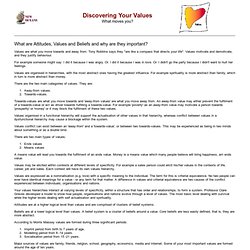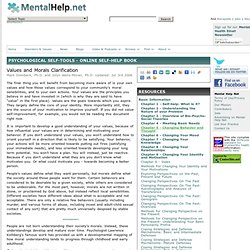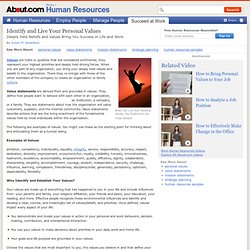

Eliciting your Values article. Www.associationforcoaching.com/pub/ACHGuide12.pdf. Eliciting Your Values. Values. What are Attitudes, Values and Beliefs and why are they important?

Values are what you move towards and away from. Tony Robbins says they "are like a compass that directs your life". Values motivate and demotivate, and they justify behaviour. For example someone might say: I did it because I was angry. Or. Values are organised in hierarchies, with the most abstract ones having the greatest influence.
There are the two main categories of values. Away-from values. Towards-values are what you move towards and 'away-from values' are what you move away from. Values organised in a functional hierarchy will support the actualisation of other values in that hierarchy, whereas conflict between values in a dysfunctional hierarchy may cause a blockage within the system. Secrets of Happiness. Sometimes we are so consumed with our daily lives that we forget to look at the larger picture of who we are and what we need to be happy.

We work, raise our children, and manage our chores, but it takes an extraordinary event such as a life-threatening illness, or the death of a loved one, to focus our attention on the meaning of our lives. I faced death for the first time when I was told I needed a liver transplant a few years ago. I thought about the meaning in my life and why I lived the way I did. I started to question the Pleasure Principle, which says that we are motivated to maximize pleasure and minimize pain.
When I was ill, I discovered exactly why I wanted to get better and continue living, and it had little to do with pleasure or pain. Pleasure theory has been around since the days of ancient Greece and is well-represented in modern-day society and academic psychology. If pleasure is not what drives us, what does? Happiness defined The 16 basic desires make us individuals. Values Clarification - How we construct our mental maps. A Reading for the Global Change Seminar.
Values and Morals Clarification. Mark Dombeck, Ph.D. and Jolyn Wells-Moran, Ph.D.

Updated: Jul 3rd 2006 The final thing you will benefit from becoming more aware of is your own values and how those values correspond to your community's moral sensibilities, and to your own actions. Your values are the principles you believe in and have invested in (which is why they are said to have "value" in the first place). Values are the goals towards which you aspire.
They largely define the core of your identity. It is important to develop a good understanding of your values, because of how influential your values are in determining and motivating your behavior. People's values define what they want personally, but morals define what the society around those people want for them. People are not born understanding their society's morals.
According to Kohlberg, infants have little or no moral sense, because they are not born with an understanding of the nature of human relationships. RN - Marya - Jun 16th 2012. Www2.binghamton.edu/career-development-center/quick-reference-guides/values.pdf. Identify and Live Your Personal Values. Values are traits or qualities that are considered worthwhile; they represent your highest priorities and deeply held driving forces.

When you are part of any organization, you bring your deeply held values and beliefs to the organization. There they co-mingle with those of the other members of the company to create an organization or family culture. Value statements are derived from and grounded in values. They define how people want to behave with each other in an organization, an institution, a company, or a family. They are statements about how the organization will value customers, suppliers, and the internal community. The following are examples of values. Examples of Values Why Identify and Establish Your Values? Your values are made up of everything that has happened to you in your life and include influences from: your parents and family, your religious affiliation, your friends and peers, your education, your reading, and more.